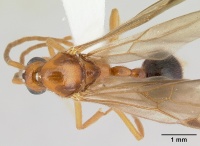Megalomyrmex glaesarius
| Megalomyrmex glaesarius | |
|---|---|

| |
| Scientific classification | |
| Kingdom: | Animalia |
| Phylum: | Arthropoda |
| Class: | Insecta |
| Order: | Hymenoptera |
| Family: | Formicidae |
| Subfamily: | Myrmicinae |
| Tribe: | Solenopsidini |
| Genus: | Megalomyrmex |
| Species group: | leoninus |
| Species: | M. glaesarius |
| Binomial name | |
| Megalomyrmex glaesarius Kempf, 1970 | |
Field observations during 2014 in Loja, southern Ecuador, have shown the species to be relatively common in the southern periphery of the city (Lattke, personal observation). Known workers came from arid localities above 2000m and the males came from forested areas no higher than 300m. (Brandão 1990)
| At a Glance | • Ergatoid queen |
Identification
Distribution
Latitudinal Distribution Pattern
Latitudinal Range: 6.025555556° to -6.783333333°.
| North Temperate |
North Subtropical |
Tropical | South Subtropical |
South Temperate |
- Source: AntMaps
Distribution based on Regional Taxon Lists
Neotropical Region: Ecuador, Peru (type locality).
Distribution based on AntMaps
Distribution based on AntWeb specimens
Check data from AntWeb
Countries Occupied
| Number of countries occupied by this species based on AntWiki Regional Taxon Lists. In general, fewer countries occupied indicates a narrower range, while more countries indicates a more widespread species. |

|
Estimated Abundance
| Relative abundance based on number of AntMaps records per species (this species within the purple bar). Fewer records (to the left) indicates a less abundant/encountered species while more records (to the right) indicates more abundant/encountered species. |

|
Biology
Field observations during 2014 in Loja, southern Ecuador, have shown the species to be relatively common in the southern periphery of the city. One colony was found in the botanical garden of the Universidad Nacional de Loja (UNL), nesting under decomposing wood under the shade of secondary vegetation. The amount of workers easily surpassed a hundred individuals. Other nests have been found on the UNL campus. One under pavement, shaded by trees, with foragers exploring the gardens, and another within a crack in the pavement surrounding a building in an exposed situation with no trees, only a disturbed area with sparse grass. Foragers seem to be more active during sunny weather.
Castes
Images from AntWeb
 
| |
| Male (alate). Specimen code casent0173981. Photographer April Nobile, uploaded by California Academy of Sciences. | Owned by ALWC, Alex L. Wild Collection. |
Nomenclature
The following information is derived from Barry Bolton's Online Catalogue of the Ants of the World.
- glaesarius. Megalomyrmex glaesarius Kempf, 1970c: 355, figs. 1, 2 (w.) PERU.
- Type-material: holotype worker, 35 paratype workers.
- Type-locality: holotype Peru: Llama, 2350 m., no. 1069 (W. Weyrauch); paratypes with same data.
- Type-depository: MZSP.
- Vieira, J.M. 2005: 82 (m.).
- Status as species: Kempf, 1972a: 139; Brandão, 1990b: 435 (redescription); Brandão, 1991: 355; Bolton, 1995b: 249; Brandão, 2003: 153; Bezděčková, et al. 2015: 118; Fernández & Serna, 2019: 806.
- Distribution: Colombia, Ecuador, Peru.
Unless otherwise noted the text for the remainder of this section is reported from the publication that includes the original description.
Description
Worker
Brandão (1990) - Mandibles striate: anterior clypeal border straight, without median denticle; frontal suture not impressed; 3-segmented antennal club; 15 ocular facets at compound eye largest diameter: occipital margin not raised: promesonotal suture impressed dorsally; mesosternum and metasternum without acrotergites; dorsal face of propodeum impressed transversally: declivity with 1 striation concentric to the foramen; epipetiolar carina complete; non-pedunculate petiole with anterior margin of node, in side view, concave and anteroventral denticle; dorsal margin of petiole node, in frontal view, subquadrate: postpetiole ventral face smooth with a round anterior process; apex of femura round.
Color: bright reddish-brown with deep brown gaster.
Type Material
Brandão (1990) - Llama, Cajamarca, Peru (06°31'S, 79°08 'W). Holotype and 35 paratypes at Museu de Zoologia da USP.
References
- Brandão, C. R. F. 1990b. Systematic revision of the Neotropical ant genus Megalomyrmex Forel (Hymenoptera: Formicidae: Myrmicinae), with the description of thirteen new species. Arq. Zool. (São Paulo) 31: 411-481 (page 435, see also)
- Brandão, C. R. F. 2003. Further revisionary studies on the ant gentus Megalomyrmex Forel (Hymenoptera: Formicidae). Pap. Avulsos Zool. (São Paulo) 43: 145-159.
- Kempf, W. W. 1970c. Taxonomic notes on ants of the genus Megalomyrmex Forel, with the description of new species (Hymenoptera, Formicidae). Stud. Entomol. 13: 353-364 (page 355, figs. 1, 2 worker described)
- Liberti, J., Sapountzis, P., Hansen, L.H., Sørensen, S.J., Adams, R.M.M., Boomsma, J.J. 2015. Bacterial symbiont sharing in Megalomyrmex social parasites and their fungus-growing ant hosts. Molecular Ecology 24, 3151–3169 (doi:10.1111/MEC.13216).
- Vieira, J. M. 2005. Nuevos registros de Megalomyrmex Forel, 1884 (Hymenoptera: Formicidae) para Ecuador, con la descripción del macho de M. glaesarius Kempf, 1970. Bol. Soc. Entomol. Aragon. 36: 81-84 (page 82, male described)
References based on Global Ant Biodiversity Informatics
- Brandao, C.R.F. 1991. Adendos ao catalogo abreviado das formigas da regiao neotropical (Hymenoptera: Formicidae). Rev. Bras. Entomol. 35: 319-412.
- Brandão C. R. F. 1990. Systematic revision of the Neotropical ant genus Megalomyrmex Forel (Hymenoptera: Formicidae: Myrmicinae), with the description of thirteen new species. Arquivos de Zoologia (São Paulo) 31: 411-481
- Brandão C. R. F. 2003. Further revisionary studies on the ant genus Megalomyrmex Forel (Hymenoptera: Formicidae). Papeis Avulsos de Zoologia (São Paulo) 43: 145-159
- Escalante Gutiérrez J. A. 1993. Especies de hormigas conocidas del Perú (Hymenoptera: Formicidae). Revista Peruana de Entomología 34:1-13.
- Fernández, F. and S. Sendoya. 2004. Lista de las hormigas neotropicales. Biota Colombiana Volume 5, Number 1.
- Kempf W. W. 1970. Taxonomic notes on ants of the genus Megalomyrmex Forel, with the description of new species (Hymenoptera, Formicidae). Studia Entomologica 13: 353-364.
- Kempf, W.W. 1972. Catalago abreviado das formigas da regiao Neotropical (Hym. Formicidae) Studia Entomologica 15(1-4).

